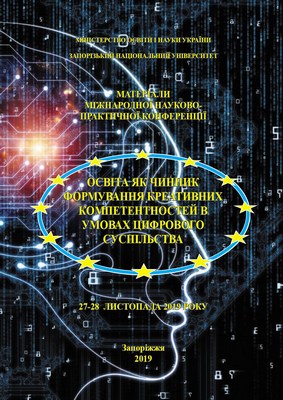Youth policy development in Ukraine - experience of the European Union
DOI:
https://doi.org/10.30839/2072-7941.2019.189188Анотація
«Youth policy» as an independent term is defined in the scientific literature in the 1960s., which in many ways «was associated with the formation of youth as an independent social force and its self-determination in the socio-political space». By the 1970s XX century youth policy in the vast majority of developed countries is transforming an independent direction of national policy.
Youth is a complex, multidimensional and rather controversial social phenomenon. Modern youth acts as the most active and mobile social group, which requires special attention from state institutions in need of socialization and adaptation. At the same time, it is youth that is increasingly viewed today as the most important and promising part of society. It is no accident that already in the mid-60s of the XX century, in the practical activities of a number of international institutions, in particular the UN, a specialized area of cooperation began to develop, in the field of education and social support for the young generation. It should be noted that in the world there are more than 1 billion 800 million young people under the age of 25, which emphasizes the importance of effective youth policy by members of the international community.
In the post-bipolar period, youth policy has become one of the priority areas of state policy of most developed countries.
A striking example in this regard is the activities of the countries of the European Union (EU) and its structures.
Europe is making significant efforts to create a single space in which not only common political institutions, but common values for all Europeans should be formed. And in this process, it is youth that acts as the key object on which measures are aimed at the formation of a pan-European identity.
In recent years, the European Union has significantly stepped up youth policy. Its mechanisms were developed (open coordination method), special institutions were formed. It seems extremely relevant to analyze the EU’s activities in this direction, to consider concrete steps taken at the European level to consolidate measures in the field of youth policy.
Despite the fact that integration processes in Europe continue, nevertheless, a number of problems have already been accumulated there today, the success of the entire European project will depend on the solution of these problems. In many ways, these problems are connected precisely with the young generation of Europeans, to whom the EU leadership has special hopes. As noted in a recent communiqué of the European Commission, “social and human capital of youth is one of the greatest European assets of the future».
Among the studies affecting various aspects of working with young people, one can single out works of S.V. Aleshchenko, V.P. Baskov, Yu.R. Vyshnevskyi, Yu.V. Volkov, T.I. Zaslavskaia, I.M. Ylynskyi, E.Sh. Kamaldynova, A.I., Kovalova, O.A. Koriakovtseva, V.T. Lysovskyi, V.A. Lukov, O.A. Rozhnov, B.A. Ruchkin, S.K. Savin, V.I. Chuprov and several other authors.
However, the young generation of Europeans faces serious challenges. The growth of unemployment, absenteeism, deprivation, the growth of radicalism, cultural indifference (including religious) – main youth problems that today require urgent solutions. Moreover, in different EU countries, these problems have varying degrees of severity. Continued heterogeneity continues to be a serious obstacle to pan-European unity. It is likely that youth policy may be another very painful issue for the future of the EU.
Thus, it seems necessary to analyze the national and supranational levels of youth policy in the European Union in order to identify their degree of coherence, common goal-setting and specific implementation methods.
##submission.downloads##
Опубліковано
Номер
Розділ
Ліцензія
Авторське право (c) 2019 Hanna Ortina, Liudmyla Yefimenko

Ця робота ліцензується відповідно до Creative Commons Attribution 4.0 International License.
Подаючи текст статті до редакції, автор погоджується з тим, що авторські права на статтю переходять до видавця, при умові, якщо стаття приймається до публікації. Авторські права включають ексклюзивні права на копіювання, розповсюдження і переклад статті.
Автор зобов’язаний:
- нести відповідальність за достовірність представленої інформації та оригінальність поданих матеріалів своєї роботи до друку;
- зберігати за собою всі авторські права і одночасно надавати збірнику наукових праць право першої публікації, що дозволяє розповсюджувати даний матеріал з підтвердженням авторства і первинності публікації у даному збірнику;
- відмова в публікації не обов’язково супроводжується роз’ясненням причини і не може вважатися негативним висновком відносно наукової і практичної цінності роботи.
Автори зберігають за собою авторські права на роботу і представляють збірнику наукових праць «Гуманітарний вісник Запорізької державної інженерної академії» право першої публікації роботи, що дозволяє іншим розповсюджувати дану роботу з обов’язковим збереженням посилань на авторів оригінальної праці і оригінальну публікацію у даному збірнику.
Автори зберігають за собою право заключати окремі контрактні домовленості, що стосуються не-ексклюзивного розповсюдження версії роботи в опублікованому вигляді (наприклад, розміщення її в книгосховищі академії, публікацію в монографії), з посиланням на оригінальну публікацію в збірнику наукових праць.
Автори мають право розміщати їх роботу в мережі Інтернет (наприклад, в книгосховищі академії чи на персональному сайті) до і під часу розгляду її в даному збірнику наукових праць, так як це може привести до продуктивного обговорення її даним збірником і великої кількості посилань на дану роботу (visnyk.zgia.zp.ua)

